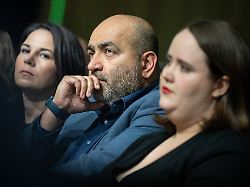The Greens face a veritable ordeal at the weekend. Germany’s approval of a more restrictive asylum policy is driving many party members up the wall. That a scandal is averted is mainly due to the fact that the Greens have an understanding – of their dwindling power.
No one should claim that the Greens would once again get bogged down in an elite ideological dispute. On closer inspection, there are numerous reasons to criticize the EU Council’s compromise on future EU asylum policy, which would not have come about without the approval of the German federal government. It does not reduce the pressure to migrate in the short term, it leads to a questionable human rights treatment of children and young people, it grinds down the right to asylum and at the same time the less receptive EU countries are not obliged to make their solidarity contribution to the accommodation of refugees.
Seen in this way, the green furor about the approval of German Foreign Minister Annalena Baerbock for this deal is less surprising than the silence in large parts of the SPD, which according to its self-image is also human rights-oriented. Their Federal Minister of the Interior, Nancy Faeser, finally negotiated for Germany at EU level.
But now the Green Party is also supporting what Baerbock himself describes as “painful”. “It tore me up too,” said the foreign minister at the small party conference in Bad Vilbel about the asylum compromise. A jointly adopted position paper on the party’s migration policy is therefore full of concessions to the recently vocal critics. Baerbock now has to fight hard for improvements if she doesn’t want to lose the trust of the base.
“Fortress Europe” becomes majority capable
Even more than these concessions by the party leadership to the critics, something else is likely to have prevented the feared scandal: the insight into the diminished effectiveness of the Greens. First of all, this applies to Germany, where the party is closer to the same in polls than to the AfD with its alarming 19 percent. The Greens are fighting against the shrinking after they started the government so enthusiastically in autumn 2021. But a year and a half later, neither climate protection nor the rights of refugees are mobilization issues. On the contrary, the mood is changing noticeably.
And not only in Germany. Whether the critics of the asylum compromise like it or not, the federal government was one of the few EU governments that opposed a more restrictive asylum policy. The right-wing populists have recently had a say in Sweden and Finland, and in Spain conservatives could soon govern together with the right-wing populist Vox party instead of the Social Democrats. The Hungary or Poland model is catching on in Europe, not in Germany.
One may find it inhumane and unrealistic, but the promise of “Fortress Europe” is currently attracting voters. The German government must cooperate with a growing number of nationalist EU governments in order to at least hold the European Union together in the midst of the dispute with Russia.
It needs a strategy
It was the insight into these irrefutable facts that prevented the great uprising in Bad Vilbel. That and the urgent appeal of the party leadership that an open dispute, even a settlement with one’s own ministers, would only have benefited the opponents, but would not have helped the Greens in the matter. What remains from that day is the party’s clear mandate to its top representatives to find a way of dealing with the situation.
The party needs a strategy that will enable its ideas of an orderly but humane refugee policy to win a majority again – starting in Germany. This promises to be a long and rocky road. But at least the Greens have found their way back to where they currently stand (not only) in migration policy: back to the very beginning.
